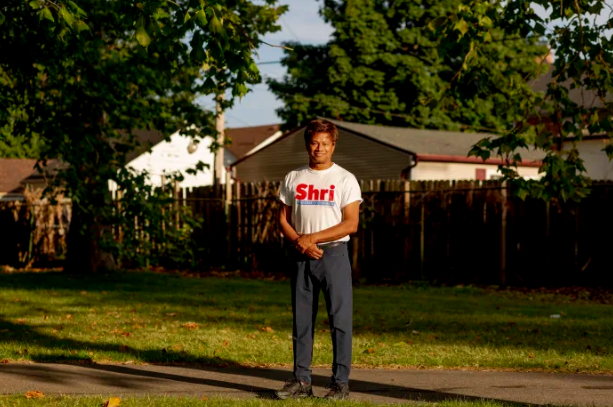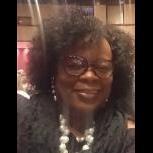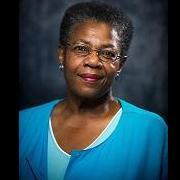-
Posts
2,404 -
Joined
-
Last visited
-
Days Won
91
richardmurray's Achievements
Single Status Update
See all updates by richardmurray
-
In Detroit, Why There's No Black Democrat on the Ballot for Congress
Clyde McGrady
Mon, October 24, 2022 at 2:25 PM·9 min read
State Rep. Shri Thanedar, a 67-year-old Indian American multimillionaire and political newcomber, in Detroit, Aug. 27, 2022. (Sylvia Jarrus/The New York Times)DETROIT — On a recent sunny Saturday afternoon in a neighborhood park in the middle of this sprawling city, residents were distributing free backpacks for students heading back to school. Girls sat patiently under a pop-up tent to get their hair braided, while other children gleefully leaped and collided in an inflated bounce castle.
One person stood out in the mostly African American crowd: a slim, 67-year-old Indian immigrant in a white T-shirt and dark pants, hopping from tent to tent and chatting with parents and neighbors, who seemed excited to see him.
The man, state Rep. Shri Thanedar, had beaten eight Black candidates in a primary to become the Democratic candidate for Michigan’s 13th Congressional District — meaning that for the first time in almost 70 years, the nation’s largest majority Black city is unlikely to have a Black representative in Congress.
Sign up for The Morning newsletter from the New York Times
His victory set off waves of anxiety among Detroit’s Black political leaders, who tried desperately to prevent Thanedar from winning. (A primary win in such a heavily Democratic district is tantamount to being elected.) Black leaders describe it as “embarrassing” and “disappointing,” and argue that Detroit should have representation that reflects its population, which is 77% Black. Three-quarters of Detroit voters supported a Black candidate.
The outcome is also testing the limits of racial representation in a city with a long tradition of Black political power — at a time when that power is being challenged and drained on other fronts. In Los Angeles, the City Council was recently shaken by the release of secret recordings of racist remarks and efforts by Latino leaders to shrink Black influence in the city.
Detroit began sending two Black delegates to Congress in the 1960s, and elected its first Black mayor in 1973. By the 1980s, Black membership and status in the state legislature was rising, and half the City Council was Black.
Now, the challenge to Black political power in Detroit comes from divisions within its own leadership and from constituents. Reapportionment cost Michigan a House seat last year, and the newly redrawn district maps reduced the number of Black voters in the 13th District. After years of severe economic insecurity and a string of political scandals, some residents are showing a willingness to try something new.
In 2013, Detroit elected Mike Duggan, its first white mayor since the 1970s — the same year that a former mayor, Kwame Kilpatrick, was convicted of charges including racketeering and extortion. Five years later, Rashida Tlaib became the first woman of Palestinian descent to be elected to Congress, when she won the seat once occupied by John Conyers Jr. — a towering figure in Detroit politics who resigned over sexual harassment allegations.
Those victories and Thanedar’s point to an emerging sense among some Black constituents that the psychic, emotional and symbolic benefits of racial representation may not have materially improved their lives.
“Well, let’s go back years and years and years, and see that when we had those people in office, they all didn’t meet up to what they said they met up to,” said Kimball Gaskinsel, a 58-year-old Black man who helped organize the backpack giveaway in the park. He said of Thanedar, “Let’s give the man a chance.”
Detroit’s population has fallen by more than 1 million since 1950, and for decades, its leaders have been promising a renaissance. Since emerging from bankruptcy in 2014, the city’s core has managed an impressive revival: Its downtown sparkles with new restaurants, shops and hotels. But Detroit’s comeback is limited and uneven, highlighting racial and economic disparities that have long frustrated residents.
Between 2010 and 2020 the city lost about 93,000 Black residents, many of whom departed for metro area suburbs, while gaining slightly more Asian and white residents, and people who identify by more than one race.
In 2021, the unemployment rate among Black residents of Detroit was 20%, compared with 11% among white residents, according to research based on census data. The median Black household earned a little less than $35,000, when rising rents and inflation began to eat into family budgets.
“It kind of irritates me to see downtown being built up and the neighborhoods being neglected,” said M. Lewis Bass, a 71-year old tenant organizer.
Bass, who is Black, voted for Thanedar in the primary. He said he liked Thanedar’s tendency to pop up at community events. “It shows a genuine interest in the citizen,” he said. Bass expressed hope that Thanedar would work to curb landlord power and address rising rents and evictions.
Other Detroiters say that residents will be worse off. “It’s disgusting” for the city to be without a Black representative, said Stevetta Johnson, 73. A retired social worker who leads the Trade Union Leadership Council, Johnson said she was concerned that a representative of another race wouldn’t look out for Black Detroiters when it comes to bringing money and resources into the city.
On the surface, Thanedar, who arrived in the United States in 1979 and later started a successful chemical business, might seem to be an unlikely politician to represent the newly redrawn 13th District, whose population is now 45% Black.
He is a wealthy man who lived in Ann Arbor before moving to Detroit three years ago. He spent $10.6 million of his own money on an unsuccessful run for governor in 2018, and he has so far spent around $6 million from his own pocket on his congressional campaign.
Activists and voters in the district’s poor and working-class neighborhoods point to how Thanedar seems to show up everywhere — at jazz concerts, at tenant meetings — repeatedly, and sometimes unannounced.
At the backpack giveaway, Thanedar told a mostly Black audience that students deserve a quality education “no matter what ZIP code they live in,” because “we are all children of the same God.” He encouraged voters to hold him to his promises. “You can have my cellphone number,” he said. “Call me.”
He ended his talk with, “I love you all.” The small crowd erupted in applause.
Thanedar often reminds Detroit voters of his humble beginnings. He said he wants to increase Black entrepreneurship, close the racial wealth gap and improve the quality of education.
For Leslie Ford, 50, a born and raised Black Detroiter who runs a nonprofit group, racial representation isn’t much of a concern. “It’s all about the person that’s showing that they care for real,” she said.
Thanedar’s supporters say that financing his campaign himself shows how much he cares, and that he isn’t beholden to special interests. “He did everything with his own money,” Ford said.
Thanedar says he is not naive about the challenges he would face in representing such a diverse district. It includes part of Detroit, several white, working-class “Downriver” communities, and the wealthier suburbs of the Grosse Pointes, with tree-lined streets of brick houses with lawns as manicured as Centre Court on the first day of Wimbledon.
He said he contacted the Congressional Black Caucus about joining once he is elected, but he learned that the caucus’ bylaws allow only Black members to join, a restriction that he says he understands.
Political observers say that many factors contributed to Thanedar’s victory. The district’s newly drawn boundaries take in some whiter, more conservative communities outside Detroit. Low voter turnout and a crowded primary allowed Thanedar to squeak through with just 28% of the ballots cast. Even so, political leaders say ignoring Thanedar’s ability to appeal to Black voters would be a mistake.
“I don’t think we can say, ‘Next time, if it’s just one Black person and Shri, it’ll be different,’ said Portia Roberson, a former Obama administration Justice Department official who lost to Thanedar in the primary. “I think that’s naive on our part.”
Detroit elected Charles Diggs to be Michigan’s first Black member of Congress in 1954, and stood by him even after he was charged with taking kickbacks from employees. Since then, the city has elected Black leaders who became major figures in national and state politics, like Conyers, Carolyn Cheeks Kilpatrick and Brenda Lawrence, all of whom represented parts of Detroit. In Washington, Black leaders from Detroit became prominent in the Civil Rights movement. At home, Conyers led the political establishment, selecting candidates and wielding influence over party loyalists and voters.
But corruption scandals and years of economic stagnation left many voters disappointed with machine politics and open to letting pragmatism rather than loyalty sway their choices.
Much of that sentiment came from the downfall of former Mayor Kwame Kilpatrick, who was first elected in 2001 and resigned in 2008 following a bribery scandal.
“Kwame Kilpatrick broke my heart. I can’t take another chance,” state Sen. Adam Hollier recalled a voter telling him. Hollier, who came in second to Thanedar in the primary, said he tried to position himself as someone other young Black men could look up to.
The lack of a clear succession plan when Brenda Lawrence decided to retire from her seat in Congress led to some disarray among the city’s political establishment.
As candidates leaped into the race, competing camps backed two different contenders, in an effort to whittle the field. Only one candidate dropped out, and the endorsement process inflamed tensions over gender dynamics.
The Legacy Committee for United Leadership, a coalition of religious, business and political leaders, endorsed Hollier. But Lawrence and the local Democratic Party organization threw their support behind Roberson, the former Obama administration official.
The fracture helped Thanedar win the primary. It left the Republican nominee, Martell Bivings, as the only Black candidate for the seat in the general election.
Bivings, 35, has been making the case that Black representation matters, in ways both subtle and explicit. He poses questions on his Facebook page like “Do you play spades?” and has tweeted that he’s the only candidate who “knows what it feels like to be Black in America.”
Bivings said in an interview that his message is being well-received by Black voters, and centers on “family values, praying in schools” as well as gun rights and lower taxes. “Your auntie supports all of those,” Bivings said. He said he supports reparations for slavery (as does Thanedar) and school choice.
The odds are heavily stacked against Bivings. In 2020, both Tlaib and Lawrence beat their Republican challengers in Detroit with more than 90% of the vote.
Do any of Detroit’s Black leaders plan to back Bivings? The Rev. Wendell Anthony, a member of the committee that backed Hollier, laughed heartily at the question, before revealing that Bivings had reached out about a meeting. “I’ll talk to anybody,” Anthony said.
This month, the conservative editorial page of The Detroit News endorsed Bivings, writing: “African Americans argue that this predominately Detroit seat should be held by someone most familiar with Detroit’s challenges. We agree.”
© 2022 The New York Times Company
Article
https://news.yahoo.com/detroit-why-theres-no-black-182550365.html
MY THOUGHTS
... MLK jr would say, judge him by the content of his character
Marcus Garvey would say, leave the USA to him, and take everybody you can with you to a different place, even if it isn't better on day one.
The Free Blacks who fought for the United Kingdom against creating the USA would say, attack the USA federal government and Michigan and detroit with him in it.
My point is, depending on yourself, your relationship to the usa government, to white people, to various factors you will relate to this story, no position is wrong.
I will add one thing, It's funny how a city that the article deems is seventy seven percent Black who feels black elected officials of the party of andrew jackson or abraham lincoln has failed, don't seem to have anyone suggesting a black party in detroit.
IN AMENDMENT
What do you think of a Black party of governance LINK




.thumb.jpg.afc88dfee9cd2927de0c440601caac13.jpg)



.thumb.jpg.ed52910791d00308abb8c218695bec88.jpg)
